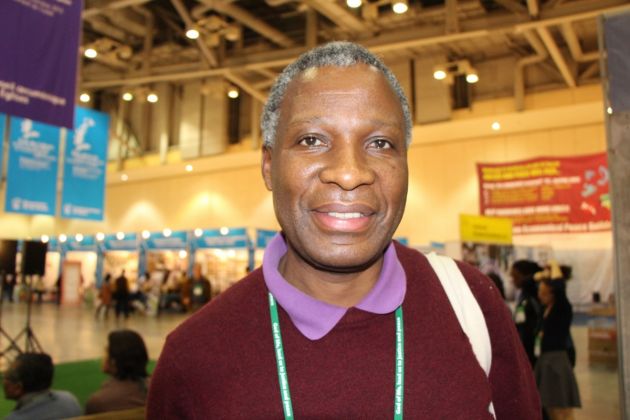South African archbishop wants one million people on anti-xenophobia march

South Africa's Anglican leader Archbishop Thabo Makgoba is urging his nation to join a "One Million March Against Xenophobic Attacks" on April 24.
Makgoba will join the late Graça Machel, wife of the late Nelson Mandela, South African pop icon Yvonne Chaka Chaka and Prof. Pitika Ntuli, a sculptor, poet and expert on African indigenous systems on the march.
"Please join me in your numbers," he asked Anglicans and other South Africans on April 24 in front of the Union buildings in the administrative capital of Pretoria.
Recent violent attacks on foreigners in big South Africa cities have astounded those who believe in the "rainbow nation" dream coined by Archbishop Emeritus Desmond Tutu and espoused by former president Nelson Mandela, both Nobel Peace Prize laureates.
"Please pray for an end to xenophobia and for tolerance. Let us be voices of reason, acknowledging the anxiety and desperation which leads to attacks on foreigners," said Makgoba who has followed in Tutu's footsteps..
Some 30,000 people marched through South Africa's biggest city, Johannesburg, on April 23 calling for an end to a recent wave of xenophobic attacks against African migrants.
Both South Africans and immigrants took part, some bearing placards reading "Africa Unite" and "Welcome foreigners."
Another anti-xenophobic protest was also held in the coastal city of Port Elizabeth after the South African army was sent into flashpoints on April deployed to flashpoints April 20 to stem the violence.
At least seven people have been killed, more than 5,000 left homeless and foreign-owned shops looted since the attacks began some three weeks ago.
"We will defeat xenophobia like we defeated apartheid," the premier of South Africa's Gauteng province, David Makhura, told the crowd in Johannesburg.
Gauteng is the economic heartland of South Africa and includes Johannesburg.
Many unemployed South Africans accuse foreigners of taking their jobs in a country where the official unemployment rate is more than 25 per cent.
Many of the migrants in South Africa are Zimbabweans, although many come from other African and Asian coungtries.
Reports indicate that around three million Zimbabweans are in South Africa after fleeing the economic and political upheavals over the past decade, New Zimbabwe reported April 22.
MUGABE BLAMED
Many of migrants blame Zimbabwe President Robert Mugabe's "scorched earth policies and mismanagement" for driving his citizens from the country to South Africa.
Speaking at an anti-xenophobia rally in Cape Town on April 22 Makgoba said, "After the attacks of 2008 on migrants from other parts of Africa, we hoped that we had seen an end to xenophobic conflict in our country.
"But more than five years on, the tension has erupted again. People are dying again.
"And now we are seeing the ominous threat of counter-attacks from people who say they can no longer sit and wait to be killed.
"We must condemn the irresponsible talk of those South Africans, whether leaders from public platforms or ordinary citizens on social media, who fan the flames of violence," said Makgoba.
He noted, people must go beyond condemnation and come up with long-term solutions.
"We have become a society which accepts economic inequality, service delivery inequality, healthcare inequality, education inequality and most seriously for me, the inequality of opportunity, because it undermines people's capacity to use their God-given gifts to improve their own lives.
"When our struggle against apartheid was at its noblest, we all joined together: the unions, the churches, the mosques, the temples, the synagogues, the shopkeepers, the traders, and enlightened business people.
"But now we have become a society in which South Africans with the courage to speak out against the wrongs they see are penalised and punished."
